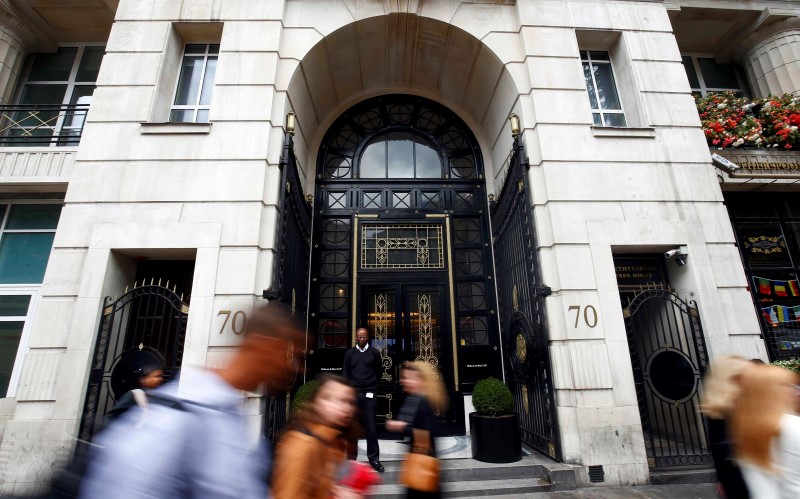By Guy Faulconbridge and Sarah Young
LONDON (Reuters) - London law firm Mishcon de Reya said it had started legal action to demand the British government win legislative approval from Parliament before triggering a formal divorce from the European Union.
Mishcon de Reya, a leading London-based firm, said a British leader would need an Act of Parliament before invoking Article 50 of the Lisbon Treaty, the trigger for formal negotiations on exiting the bloc Britain joined in 1973.
The action is the first concrete signal since the June 23 referendum that the implementation of the 52-48 Brexit vote could be challenged, or at least amended.
Because the referendum is not legally-binding, some lawmakers and campaigners have suggested that Parliament review the vote, call a second referendum or at least that Article 50 be voted on by Parliament to ensure Britain gets the right deal.
The law firm said in a statement that its clients were a group of concerned British citizens, but it did not name them or say who was paying for the legal action.
"The outcome of the Referendum itself is not legally binding and for the current or future Prime Minister to invoke Article 50 without the approval of Parliament is unlawful," Kasra Nouroozi, a partner Mishcon de Reya, said in the statement.
Nouroozi said the government must allow "Parliament to fulfil its democratic duty which is to take into account the results of the Referendum along with other factors and make the ultimate decision."
A spokeswoman for the law firm refused to give the names of those backing the action, though property website Zoopla said its CEO Alex Chesterman was supporting the move.
The Brexit vote unleashed panic in foreign currency markets, pushing sterling to a 31-year-low, and prompted the most serious political crisis in modern British history with both main parties in turmoil.
Though stocks in the FTSE 100 index have recovered, many investors are trying to gauge whether Brexit really means Brexit and, if so, what Britain's post-Brexit trading relationship will look like.
All five Conservative Party candidates running to replace Prime Minister David Cameron say Britain will leave the EU and say the negotiation will hinge on the balance between limits on immigration and access to the European Single Market.
Cameron has said the decision on triggering Article 50, 250-words in the Lisbon Treaty, is for the next prime minister.
"I very much deprecate the idea of law firms, big law firms, trying to interfere in our political system to overturn the will of the people," Foreign Secretary Philip Hammond said. "We don't need ultra-high-paid lawyers trampling all over the political space."
The European Union has called on Britain to trigger Article 50 as soon as possible. Some leaders are angry at Cameron’s failure to act on the referendum result while others are concerned that London is using the delay as a tactic to improve its negotiating position.
Once Article 50 is enacted Britain will be under to cut a new trade deal within two years or face being dumped out of the bloc.
PARLIAMENT
Mishcon de Reya disputed the government's suggestion it has sufficient legal authority to trigger Article 50 without recourse to Parliament and the devolved governments of Scotland, Northern Ireland and the Welsh Assembly.
"It is their job to take into account the results of the Referendum along with other factors and make the ultimate decision," the law firm said.
It has been in correspondence with government lawyers since June 27 to seek assurances for its clients that the government will respect the sovereignty of British parliament.
The Conservative government currently has a working majority of 16 in the 650-seat House of Commons.
The majority of lawmakers supported EU membership and though many would be wary of directly opposing the will of 17.4 million voters, some lawmakers could try to delay Brexit while imposing conditions on any divorce negotiation.
"Any member of parliament who turns around and says 'I do not accept the freely expressed democratic will of the people of the United Kingdom' I don't think deserves to have a place in the House of Commons," Conservative leadership candidate Liam Fox said.
The argument for Parliamentary approval before invoking Article 50 is based on a reasoning of the authority for EU law in the United Kingdom. Under this reasoning, EU law applies in the UK because of the European Communities Act of 1972 so the executive cannot undermine rights given by Parliament by triggering Article 50.
But lawyers are divided.
ARTICLE 50
"I have not taken a final view on this, but my inclination at this point is that the government position is correct," Derrick Wyatt, one of Britain's top experts on European law, said by email.
Wyatt, a law professor who gave evidence to the House of Lords on EU law, said that the government generally makes treaties under its executive power.
"It is true that giving effect to a treaty might involve making new laws, and repealing those laws if the UK terminates the treaty. But the process of signing up, and withdrawing, is generally seen as a government function, separate from the parliamentary function of adopting any necessary laws," he said.
But Jeff King, a senior lecturer in law at University College London, said Parliament must give its assent before a prime minister can trigger Article 50.
"What we are saying is that Parliament should determine how the process of withdrawal should work," King said by telephone. "It is about how, not whether."
He said he was not part of the Mishcon de Reya action, which he said could go to the High Court and then to judges in the Supreme Court.

"The law requires that Parliament give the Prime Minister authorisation to issue a declaration under Article 50," King said. "That is a legal argument but it is not just a formality. There are policy reasons why that is a good thing too - Parliament may stipulate what the framework for bargaining may be."